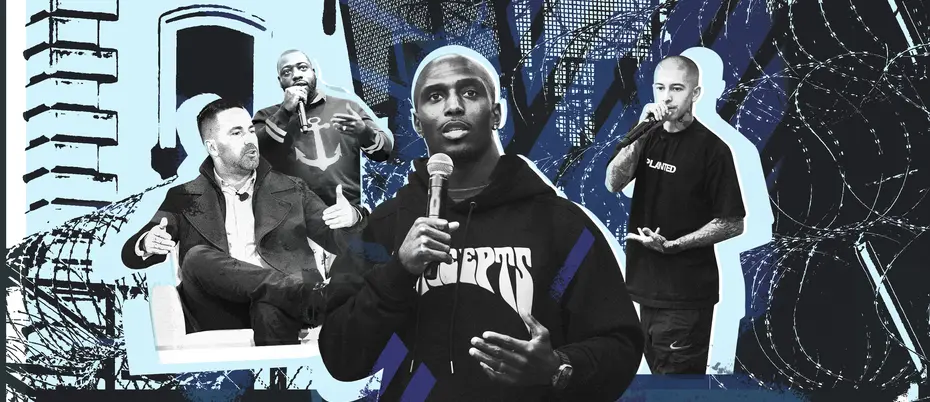Public Policy
From Hollywood to the gridiron, advocates champion restorative justice
Restorative justice has a strong connection to sustainability. Here’s how leaders with different backgrounds and life experiences advocate for formerly incarcerated people.
Hollywood film producer Scott Budnick was working on the movie “Old School” when a friend asked him to be a guest speaker for a creative writing course in a Los Angeles juvenile detention center.
As he introduced himself to the students, Budnick learned that many of them were serving life sentences, like 15-year-old David, who’d been involved in a nonfatal shooting and had had no one to advocate for him throughout the legal process.
Motivated by stories like David’s, Budnick continued to teach the creative writing class, expanded his advocacy by launching the nonprofit Anti-Recidivism Coalition, and started the entertainment company 1Community, which produced “Just Mercy,” a film about criminal rights defense attorney Bryan Stevenson, among other offerings.
Budnick was one of several leaders hosted by the MIT Sloan Sustainability Initiative who have committed time and resources to restorative justice, a rehabilitation model that encourages offenders to take responsibility for their actions and rebuild relationships.
Other speakers included former New England Patriots captain Devin McCourty, celebrity barber and entrepreneur Victor “VicBlends” Fontanez, and Emmanuel “Noble” Williams of the Transformational Prison Project.
MIT Sloan Sustainability lecturer James Repenning explained the connection between restorative justice and sustainable business.
“When you’re just trying to provide for yourself and your family, a lot of things go out the window,” Repenning said. “When you are at the basic level, then you are going to eat the last fish, you are going to cut down the last tree. We have to take care of our communities if we want to take care of the world.”
Here’s a closer look at the ways these leaders with vastly different backgrounds and life experiences are pulling in the same direction for restorative justice, and why that’s important to the foundation of sustainability.
Related Articles
Equip former offenders with marketable skills upon release
Victor Fontanez used his barber talents to find success — flying in private jets, cutting the hair of rappers and NBA players — but when the pandemic hit, he began to reexamine his work and life. Instead of cutting celebrity hair, he started cutting strangers’ hair, recording his conversations with them, and sharing the process on social media under the name VicBlends.
Budnick called Fontanez, asking whether he’d be willing to meet some of the juvenile offenders who loved his online barber videos. Now Fontanez and Budnick are working together to develop a barber licensing program within California’s prison system.
Repenning, who served as president of the Floyd’s 99 Barbershop chain from 2019 to 2021, explained that a barber’s license requires 1,500 hours of schooling and can cost tens of thousands of dollars. That can pose a nearly impossible barrier for people reentering society.
“They need to start working immediately, both to pay for necessities and to satisfy parole requirements,” Repenning said. “Lacking specific, marketable skills, they often qualify for no more than entry-level jobs that do not pay a living wage. In addition to paying for the basic necessities, they must often pay restitution as well.”
Providing a licensing program within the prison system has the potential to address several of these problems simultaneously.
Lend a welcoming hand to those reentering society
Noble Williams was born and raised in Boston. He grew up in low-income housing with two parents who battled substance abuse. By his 10th birthday, he’d already witnessed a murder.
“So many crimes were committed against me before I committed my first crime,” Williams said. “All the time being stopped by policed, being questioned, being searched.”
He became the leader of a gang, got more involved with criminal activities, and ended up taking a blind plea for nine to 12 years behind bars. It was during his incarceration that Williams was introduced to the Transformational Prison Project.
TPP was founded in 2013 by inmates at MCI-Norfolk, the largest medium security prison in Massachusetts. Initially, it was just a small group meeting where the men could share their stories; today, the organization partners with law schools, crime survivors, and other restorative justice groups to help those impacted by crime and incarceration, both inside and outside prisons and correctional institutions.
When people get out of prison, they’re often left to figure out reentry on their own, without any help, Williams explained.
“That’s how we continued to grow our organization,” said Williams, now TPP’s senior director of programming and a teaching assistant at Columbia University’s School of Social Work. “So as people come home, we’re there to support them and walk them through the process.”
Find strength in numbers, and speak up for others
Former New England Patriots player Devin McCourty was introduced to TPP earlier this spring, when he joined one of the project’s restorative justice circles. But the defensive back has been using his own platform to raise awareness of racial and restorative justice since 2016.
McCourty was one of about a dozen Patriots players to start kneeling during the national anthem at games after an increase in incidents of police-involved shootings. The silent protest motivated McCourty and his twin brother, Jason, to start lobbying the Massachusetts State House for more funding for public schools — particularly those with more lower-income students — and to raise the minimum age of criminal responsibility from 7 to 12 years old. He also hosted a screening of Budnick’s “Just Mercy” in 2020.
One of the main lessons McCourty said he’s learned from his advocacy is that there is strength in numbers. When McCourty knelt at Sunday afternoon football games, he did it because he knew that millions of people would be watching. And whether someone is a professional athlete, a Hollywood producer, or an MBA student, they can use their reach to grow awareness.
“I think it is crucial for people like me to go and be at TPP [and] understand Noble’s stories,” McCourty said. “I need to understand what he’s gone through — or people like him have gone through — to go tell those stories.”




